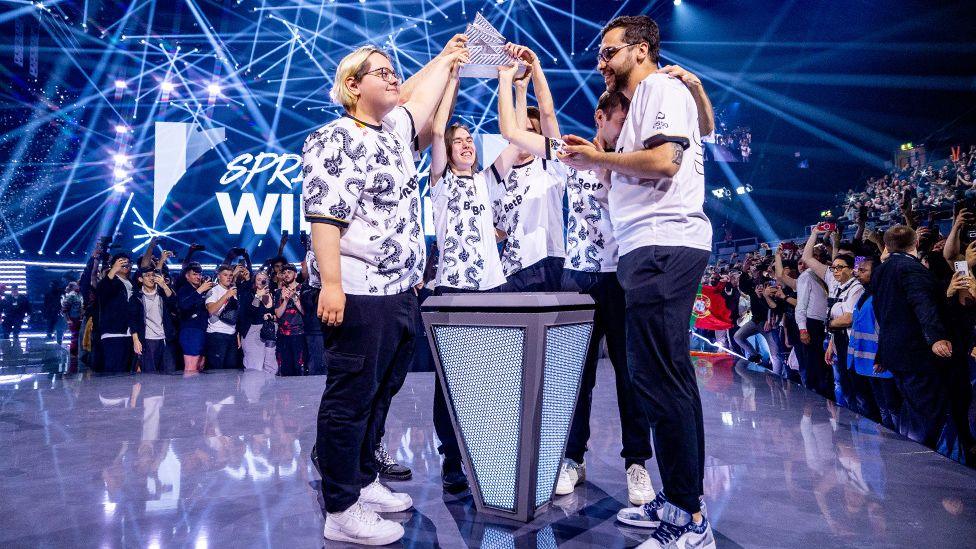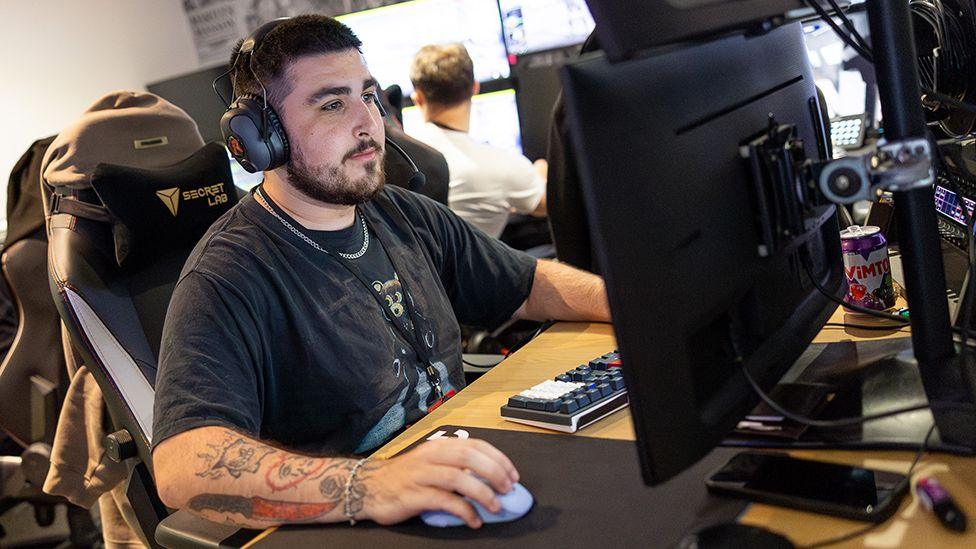Virtual camera operators: The unsung heroes of esports

Team Spirit took home the trophy at this year's Blast Premier Spring Final
- Published
No matter what sport you love, when you’re watching and cheering on your team you don’t want to miss a second of the action.
That’s why one of the most important, and often least appreciated jobs, is being one of the many camera operators.
It’s no different in esports, and that’s where people like Jake come in.
The 25-year-old, also known as zarx online, is one of a team of four "observers" who act a bit like cameramen on the virtual battlefield.
They work together to give a comprehensive picture of how the action is unfolding.
Some will have the ability to jump between player perspectives, seeing exactly what's on their screen.
Others will control in-game cameras on the ground or in the air, taking a bird's eye view of the match. And some, watching on a seven-second delay, manage replays.
"Essentially, an observer is your main person bringing you all the action in-game. So everything you see, the camera angles or the kills, that’s our job," he tells BBC Newsbeat.
Jake's work is on show at Counter-Strike tournaments, such as the BLAST Premier Spring Final, hosted at London’s Wembley Arena over the weekend.
The five-against-five first-person team shooter is one of the biggest esports globally, attracting millions of viewers each year.

Jake is part of a four-person crew dedicated to capturing all the action during Counter-Strike matches
While Jake now gets paid to travel the world and work, it all began as a hobby back in 2018.
"I started streaming my friends in online league matches, just to show my other friends. Then one day a company reached out.
"It kind of just snowballed from there."
It’s a job, he says, he didn’t even know existed. "I’m pretty lucky to be where I am today."
This weekend, at the first big international Counter-Strike tournament in the UK for a while, Jake had the pressure not just of a huge crowd, but a home crowd too.
More than 18,000 people watched in-person over the weekend, with thousands more watching on live streams on Twitch and YouTube.
They got to watch Belgrade-based Team Spirit lift the trophy and win a prize of $200,000 (£150,000), after beating rivals Navi 3-1 in an action-packed grand final.
Does a crowd mean more distractions?
"I prefer having a bigger crowd," says Jake.
"Just the hype every time you capture a kill. You can feel the rumble of the crowd and your adrenaline starts going. I love it."
Global final kicks off UK's bumper esports year
- Published29 April 2024
Could Nintendo's new rules smash its esports scene?
- Published15 November 2023
How esports helped a snooker player go pro
- Published23 August 2023
This year’s BLAST Premier tournament is part of a particularly big year for UK esports.
It started with ESL One in Birmingham and is building up to one of the biggest global esports events - the League of Legends World Series final at London's O2 in November.
Jake says he thinks the UK crowds are one of the best in the world and a key reason why it's attracting so much attention.
But he adds there is a lot more work to do to make the UK a global esports powerhouse.
"For a player in the UK, it’s not the best place," he says.
Smaller leagues and teams have faced problems recently, with Royal Ravens, the UK’s only competitive Call of Duty team, relocating to the US last year.
But Jake says that's not why he chose to record the matches rather than take part in them as a player.
"I was just terrible," he says.
And even though some observers switch between different esports, Jake is dedicated to Counter-Strike.
"It’s just the game I love. I started playing in 2016 and I was hooked ever since," he says.
